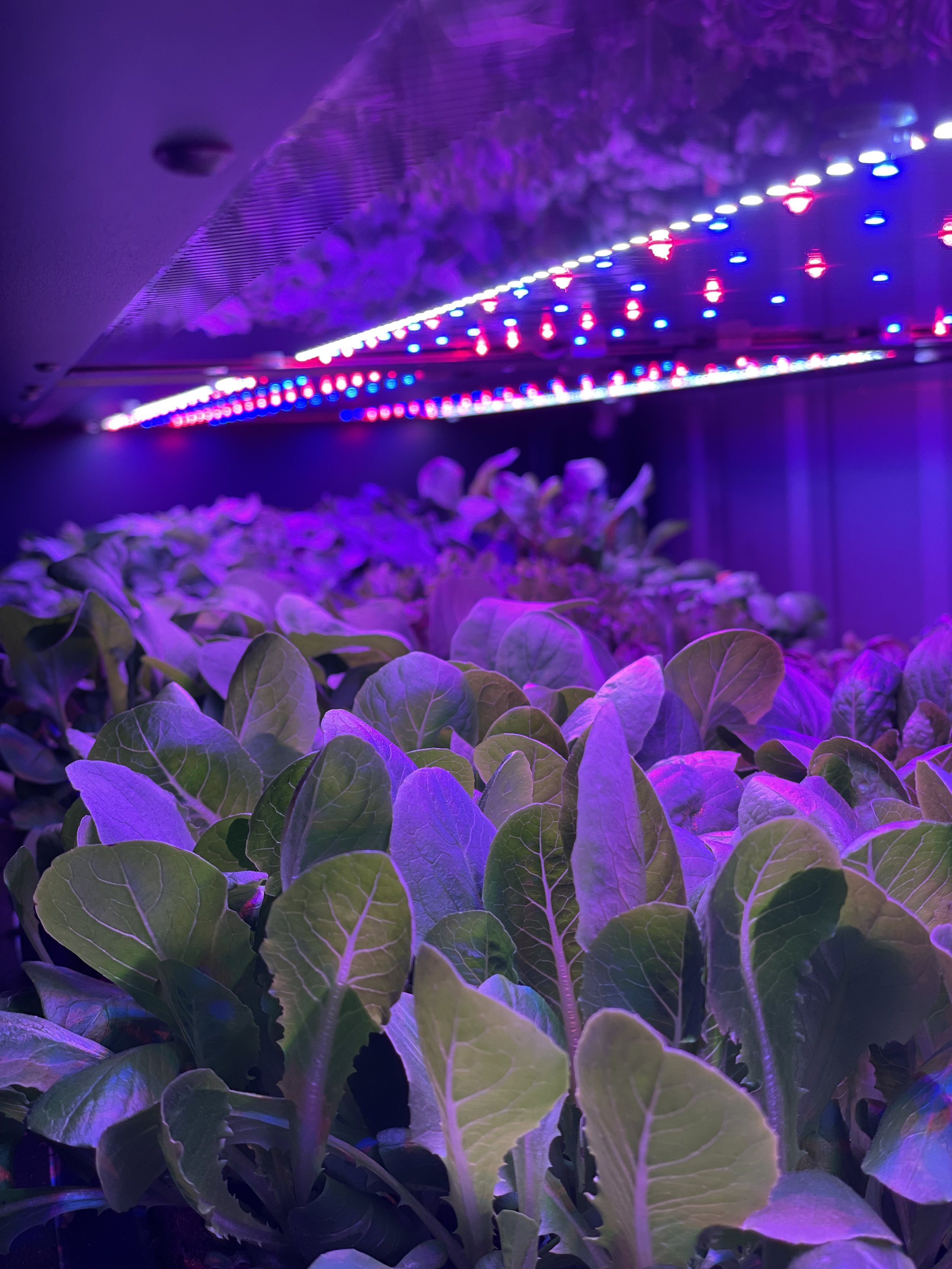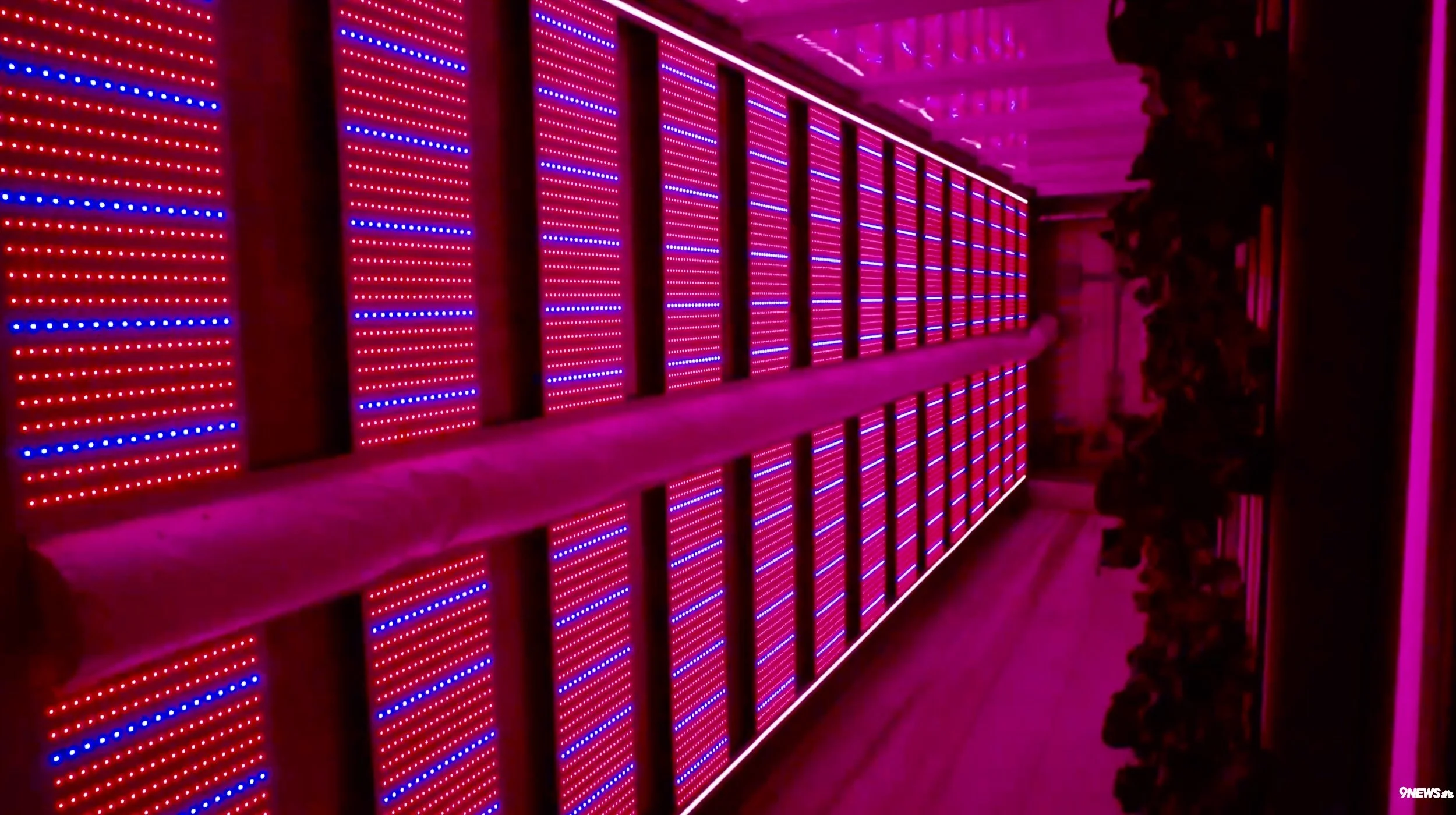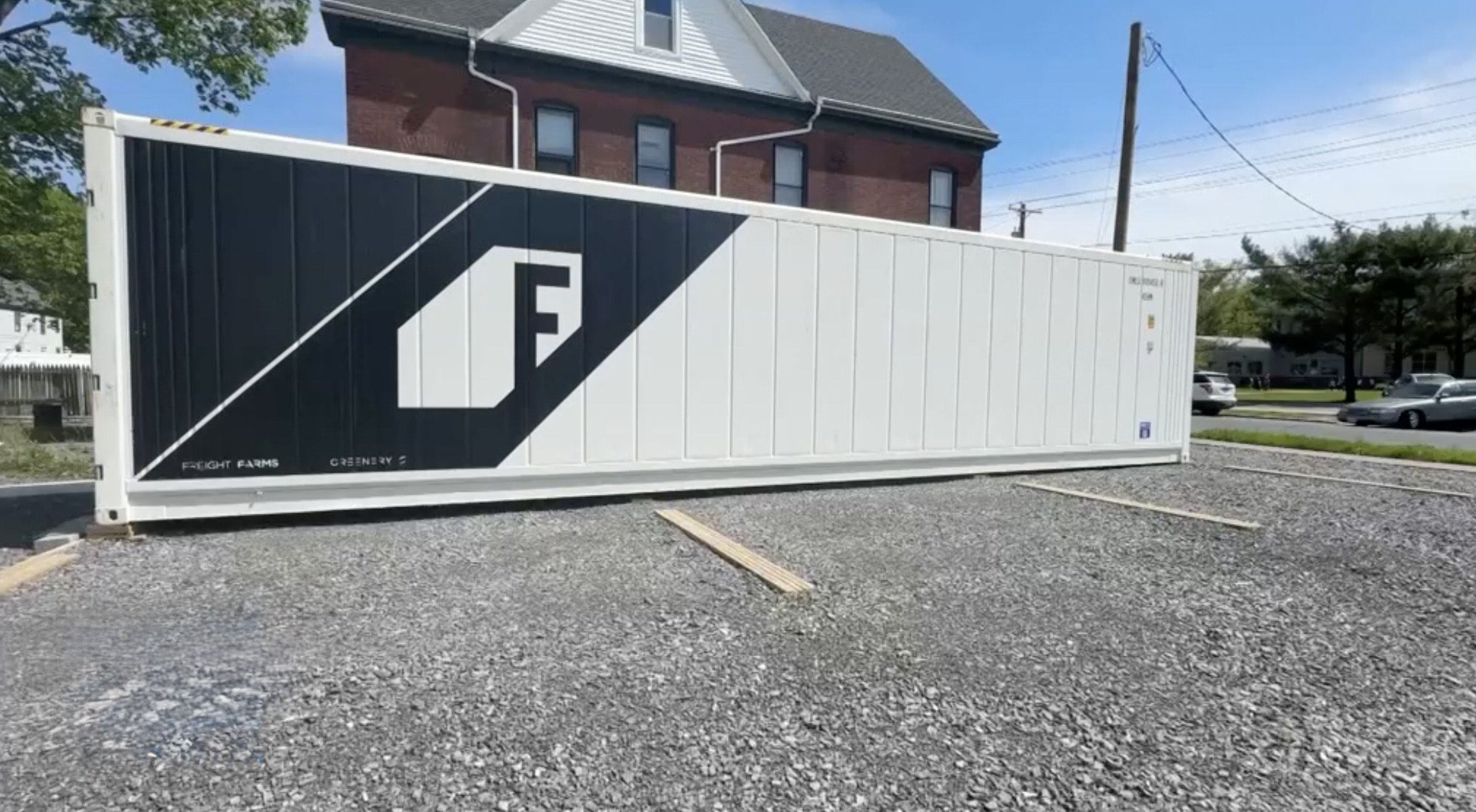
News About Farming in Shipping Containers & Limited Indoor Spaces
Canadian Shipping Container Farm Manufacturer “Growcer” Acquires Freight Farms’ Assets, Pledges To Support Growers Worldwide
Update: We've won the bid to acquire Freight Farms' assets.
A few months ago, one of our top competitors filed for bankruptcy, and the Growcer team sprang into action to help their community of farmers keep growing.
One of the options we explored was throwing our hat into the ring to purchase substantially all of the company's assets (such as an inventory of complete farms, spare parts, software, all intellectual property, and subscriptions etc.). We rallied a group of key partners, and I'm thrilled to say that we were able to make it happen.
USA - COLORADO - VIDEO: Grand County Farmer Grows Food Year Round for Guests and Food Banks
For over 90 years this 700 acre family guest ranch has provided folks from around the world with authentic western ranch vacations. Nestled in its own private mountain valley in Granby, Colorado, Drowsy Water Ranch promises the opportunity to disconnect from your daily hustle and bustle, and reconnect with family and friends under the backdrop of big mountains and starry skies. Under the same ownership/management since 1977, The Fosha’s have developed a world-renowned reputation for unpretentious quality.
We warmly welcome you to experience the true spirit of the West at our Colorado dude ranch all-inclusive vacation.
VIDEO- Hydroponic Farm Grows Vegetables 365 Days A Year For Local Communities
For many people, going to the grocery store and selecting fresh vegetables is part of their routine. But not everyone has that luxury and food insecurity is an issue we see in many communities.
One man is trying to help change that.
“We’re actually standing inside a 40-foot shipping container that’s been outfitted as you can see to grow vegetables. It’s hydroponic, so it runs on. We just supply water, nutrients and lighting and we grow vegetables that way,” said James Paul, executive director of Blacque Acres, a nonprofit organization that was just an idea three years ago, but has become a reality to help address food insecurity.
Where Food Justice Meets Hip-Hop: Inside Seattle's Cherry Street Farm
Nestled on a small hill between the vibrantly colored houses of East Cherry Street is a farm capable of producing two-and-a-half acres' worth of crops, all in a metal freight container the size of a school bus.
To any passersby, Cherry Street Farm looks no different from a misplaced shipping unit. Indeed, the hydroponics setup, which grows plants in a controlled climate using a nutrient-enhanced water drip, is built within a converted shipping container by Freight Farms based in Boston, and it's Seattle's first Freight Farms hydroponics lab.
Stepping into the container is like walking into a completely new biome. First, the humid air hits the nose with the fragrance of fresh earth. It took a minute for my eyes to adjust to the intense glare of the red and blue LED lights before I could focus on the grow operation: four floor-to-ceiling sliding plant walls.
VIDEO: Wyoming Students are Growing Salad in a Former Shipping Container
A group of Central Wyoming College (CWC) students have repurposed an 8-by-40-foot shipping container to successfully grow delicious vegetables and herbs without soil, sunshine and acres of space in a sustainable way, reports Cowboy State Daily. These students are enrolled on a Regenerative Small-Scale Farming AAS degree. According to CWC, it is the first of its kind in Wyoming.
“We’ve been fortunate to be able to bring this kind of technology to the area,” shares local food and agriculture instructor, Ethan Page. “I think this is one of two freight farms in the state, and the only one that’s kind of served, or has like an educational purpose,” he adds.
The Challenge and Opportunity of Container Farming
The most recent monthly Indoor Ag Conversations webinar hosted by Indoor Ag-Con, held June 3, focused on “The State and Future of Container Farming.”
Container farming is a form of small-scale controlled environment agriculture — i.e. indoor or vertical farming — that is often built inside shipping containers. The units are self-contained, able to be moved to the necessary location and allow for small-scale out-of-season growth of fresh produce.
They are not without their challenges, however. The talk included four panelists from the container farming industry discussing the impacts of Freight Farms and its recent collapse, the challenges of the industry, and where it goes from here.
New Vertical Farm at Illinois State University to Serve as Example of Sustainable Urban Agriculture
“This project is about more than just growing food,” said Illinois State University President Aondover Tarhule. “It’s about harnessing the power of technology to reduce our dependence on traditional, resource-demanding agricultural methods. Vertical farming technology can be used to address some of the biggest challenges we face, including food security, environmental responsibility, and sustainability.”
The Vertical Farm uses a repurposed shipping container with an enclosed, controlled environment for growing plants year-round. The 40-foot-by-8-foot (320 square feet) container is designed using a vertical hydroponic growing system with a recirculating nutrient solution and light-emitting diode (LED) lighting system. The Vertical Farm unit will be able to grow 4,600 plants, production equivalent to 1-2 acres of field production, using 95% less water or approximately 5 gallons of water per day.
Wyoming Students Turn Shipping Container Into High-Tech Greenhouse
While the rest of the Wyoming is fast asleep, there’s a secret world in Lander filled with thousands of green and growing things that are all wide awake, bathed in bright LED sunshine.
The green and growing things are mostly stuff you’d eat in a salad — big Bibb lettuces and crinkly, crunchy kale. But there’s also mounds of emerald-green basil, whose leaves fill the air with the most enchanting aroma whenever a passerby happens to brush the leaves, no matter how gently.
These green creatures live in a most unlikely space. An 80-by-40-foot shipping container that a casual visitor could easily mistake for a storage unit. But open the doors and an amazing George Jetson-style farm is revealed.
Innovative Farmer Grows Fresh Produce All Winter Without Using Soil or Sunlight: 'Food is a Right For People'
Nour El-Naboulsi, an innovative farmer in Burlington, Vermont, grows tons of fresh produce all winter without using any soil or sunlight, according to Vermont Public Radio.
How is that possible, you ask? With hydroponics, a well-proven technique for growing plants indoors using nutrient-rich water and specific climate controls.
That might sound like something only a fancy laboratory can pull off, but El-Naboulsi built a fully operational growing space inside a retrofitted shipping container.
VIDEO: Freight Farms - Community Keynote: How Growcer Can Help + Survey
We’re actively supporting Freight Farms customers to keep growing. We’re working with current and former Freight Farms customers to create immediate and long-term solutions for your farm operations.
We are offering live support to chat through solutions and multiple support package options to help you move forward. Help us help you: Please take a minute to share your thoughts with us.
Your feedback will be used to build/source solutions that are relevant to where you need the most support.
What we need is a critical mass of farmers who are interested to unlock certain solutions so please signify your interest by taking the survey before the deadline.
King Tide Farms
I am a 3rd generation farmer so farming is in my blood. After college, I began working in the agricultural chemical industry in row crops. Here I learned what it takes to feed a nation and the logistics of it all. This is where my journey began but not until 2019 while I was in the Bahamas helping rebuild after Hurricane Dorian that I realized what my path would be.
I have held every kind of sales position imaginable so I knew I was just looking for the right product to put my knowledge, skills, and abilities behind to make it a success. This is when I began looking into hydroponics farming and more specifically Controlled Environment Agriculture(CEA). We are located in Charleston, SC which provides long growing seasons but unfortunately, land close enough to cities to sustain a profitable business is just unaffordable.
USA - KANSAS: Leafy Green Farms: A Farm in a Box
Brad Fourby is not your average Pittsburg, Kansas farmer.
While he’s harvested hundreds of heads of lettuce and produce on his farm, he rarely does so under the Kansas sun or on a John Deere tractor.
Instead, this native Californian turned Kansas farmer spends his time growing produce inside his 320 square-foot indoor hydroponic farm, Leafy Green Farms.
But what exactly is hydroponic farming?
In simple terms, hydroponic farming is the process of growing crops with water-based nutrients rather than soil. Instead of planting crops out in a field, hydroponic farming utilizes a controlled environment approach to agriculture, meaning the environment in which the crops are grown is managed to optimize growth and resources in a setting where variables like temperature, humidity, and light can be controlled.
Illinois State's Cilantro Will Soon Be Grown on Campus, Inside New Vertical Farm
The farm, which officially launched Thursday, will operate out of a converted shipping container outside ISU’s Office of Sustainability on School Street. The 320-square-foot unit is equipped with hydroponic system and LED lighting to grow the equivalent of 1-2 acres of traditional field production with a fraction of the water required to grow up to 4,600 plants.
Taco Tuesdays at Illinois State University are about to get fresher as a new Vertical Farm prepares to grow cilantro for dining services.
Professor of Agriculture David Kopsell gives a tour of ISU's new Vertical Farm. The converted shipping container is expected to produce 50 pounds of cilantro per week for campus dining services.
MINNESOTA: Route1 - Growing Food, Feeding People, Connecting With The Earth
The morning sun casts long shadows over the fields as farmers swiftly load crates of freshly harvested produce onto a waiting distribution truck. The scent of damp earth and ripened vegetables fills the crisp Minnesota air. A rhythmic chorus of voices calls out orders as hands pass boxes from one to another, each filled with vibrant greens and fragrant herbs. The truck’s reverse alarm beeps steadily, a signal of movement and progress.
Standing at a distance, Marcus Carpenter watches with quiet satisfaction. His dream, Route1 — born from a time of crisis and a deep-rooted passion for agriculture — has manifested before his eyes. The food will soon be on its way to those who need it most, carrying a message of resilience and empowerment.
How Much Does it Cost to Ship a Container Farm?
Shipping a container farm might not be something most people have experience with, but when you're planning to bring a Freight Farm to your site, it's one of the most important details to understand. The cost of delivering a container farm depends on a variety of factors: where you’re located, how accessible the site is, and even what time of year it is.
While there’s no flat rate for delivery, this guide will walk you through the main drivers of cost, give you ballpark price ranges, and help you plan for a smooth, cost-effective delivery.
Freight Farms are delivered as fully built, production-ready units. That means they’re shipped as a single load on a specialized trailer called a stepdeck, which accommodates the height and weight of the farm. Each farm is delivered one at a time, no shared loads, no cross-country warehouse handoffs, and no typical freight carriers like UPS or FedEx.
Hydroponics Provide Year-Round Growing For Alaska Farmers
Nestled between two train cars-turned-restaurants on the other side of town, Henry Krull walks inside his shipping container farm. He points to a wall that's growing hundreds of bunches of butter lettuce.
Krull is the owner of fresh365, another Kenai Peninsula based hydroponic farm. Just like Edgy Veggie, the farm operates entirely indoors.
fresh365 owner Henry Krull holds a box of lion's mane. The hydroponic farm recently started growing mushrooms alongside its greens and herbs.
“The advantage of growing indoors, in a container like we have, is that we can control the environment," Krull said. "We can grow no matter what’s going on outside. It can be 30 below outside, but it’s always 70 degrees or so inside.”
fresh365 also sees an uptick in direct-to-consumer sales in the winter. Otherwise, most of their sales go to other businesses, like local restaurants.
St. Helena Island Company Grows Vertically To Meet Demand
A wall of lettuce was rolled aside to make way for rows of colorful edible flowers as Selma Davis looked through her hydroponic farm like a librarian confidently sifting through shelves of books.
She picked a piece of bright green arugula. "Give that a try. It is the most unbelievable arugula," Davis said. "It's spicy because it's older."
The bushels of arugula are among dozens of greens grown vertically within a large shipping container dropped by a crane on St. Helena Island farmland. On the inside, the 320-square-foot structure is high tech, using water to produce large yields of pesticide-free greens and vegetables through hydroponics.
Navigating Tariffs and Supply Chain Challenges: Why Local Food Production Matters
Supply chains have always been complex, but recent global events have made them even more unpredictable. Between food safety concerns, disruptions caused by COVID-19, and evolving tariff policies, businesses and organizations that rely on food imports have faced increasing challenges.
These factors highlight why local food production is more important than ever - whether for farmers, schools, hospitals, or businesses looking to create a more stable and reliable food source.



















